Why a Filmmaker Left Behind the Glitz & Glam of the Industry to Take up Farming in a Village
Saraswati found the need to get involved and be a part of the community reeling under globalization, so she joined the farmers.
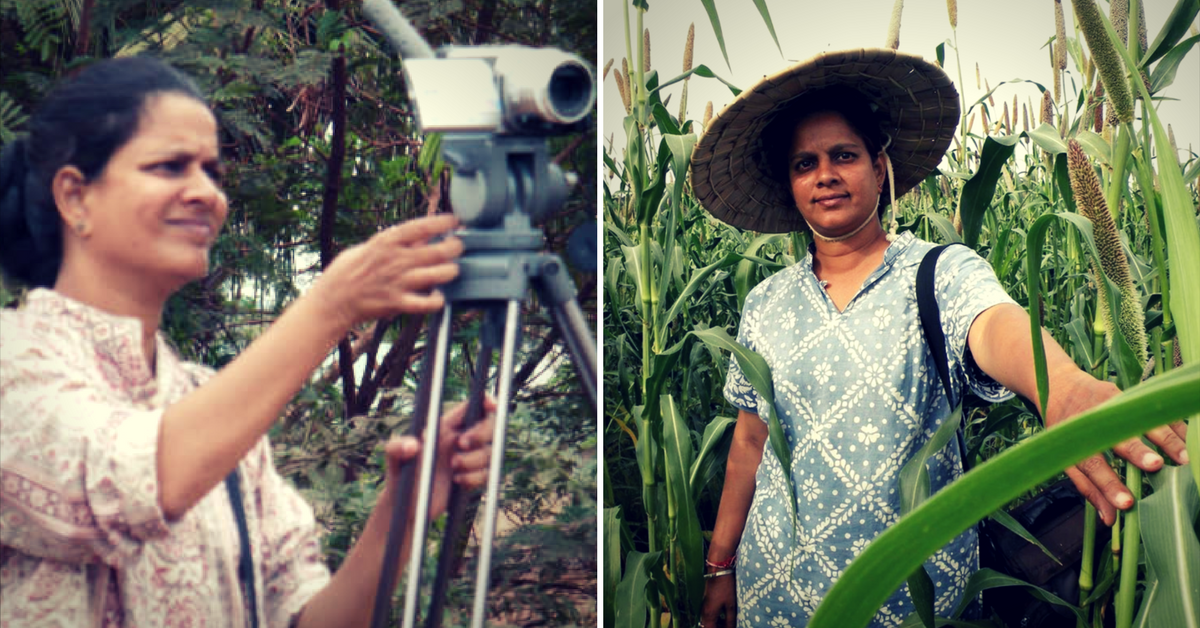
“I can’t have right to tell the youth of the villages to stop migrating while I continue to enjoy the city life. So I opted to stay here and become a part of their life,” says Saraswati Kavula.
Saraswati has now taken up farming as a form of sustainable livelihood at Nandi Wanaparthy village near the Nagarjuna Sagar Dam, Andhra Pradesh, where she has a mango and Indian gooseberry orchard planted in five acres and she has grown millets and lentils in three acres of land.
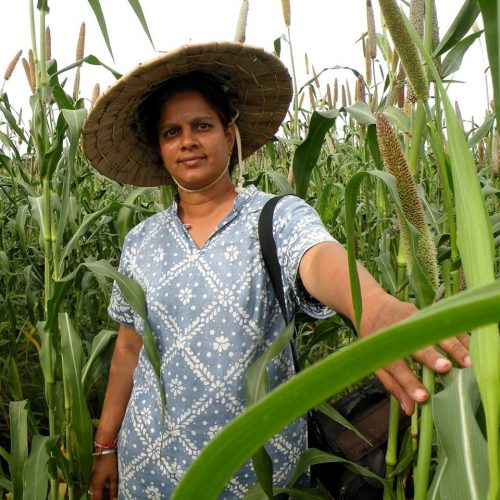
Graduated from the Institute of Hotel Management, Hyderabad, Saraswati worked in the hotel industry for a couple of years, followed by a short stint in a private bank. Finally, she found her niche in creative work making documentary films and writing in various genres.
“I quit twice when I was working in the hotel. I realised that I didn’t want to wake up every day with the feeling that I don’t want to work. I wanted to be a freelancer,” she says.
Once she was sure about her passion for films, she went to the UK to pursue a course in filmmaking, which was followed by a stint in commercial cinema. She did the costume designing and was the assistant director for Morning Raaga, starring Shabana Azmi and Perizaad Zorabian. In the meanwhile, she also worked for All India Radio and Doordarshan, and that’s when she realised that making documentaries was her cup of tea.
She started her journey as a filmmaker in 2001. However, from 2005, she chose to make only independent documentary films.
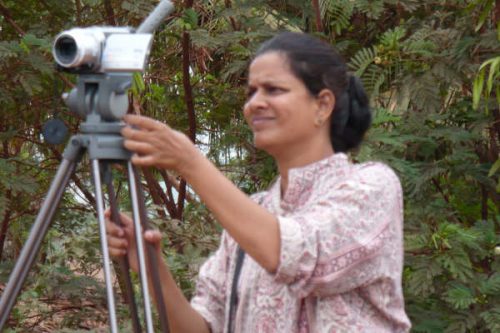
“While doing corporate films I realized that I was promoting something I don’t believe in, so I chose to do documentaries,”Saraswati tells TBI from her farm.
As a documentary filmmaker, she has travelled the length and breadth of the country and highlighted issues pertaining to the setting up of special economic zones and the coastal industrial corridor, pollution of the Musi river, illegal mining, and so on.
You may also like – This Journalist-Turned-Farmer Is Putting His Village on the Global Map!
Saraswati’s documentary Vision 2020 portrays the complexities that we are facing today. Seeds of Sovereignty, another film by Saraswati, unveils the dark side of introducing hybrid seeds and chemical fertilizers in the name of Green Revolution.
During her journey as a documentary filmmaker, she came across a lot of environmental issues that had to be addressed. Thus Saraswati became an environmental activist, often wondering why only a certain section of the society had to sacrifice for the rest to develop.
In 2003 while working as an assistant director for the movie Morning Raga, Saraswati went for a meeting for a movement against uranium mining and joined the group.
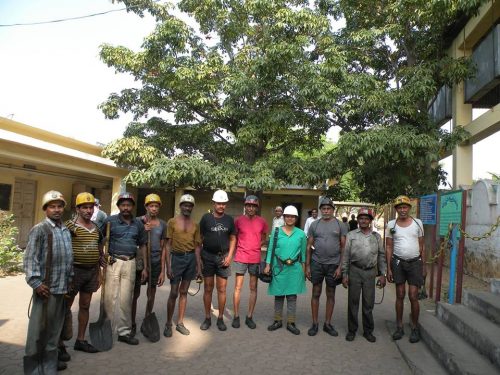
She continued working with this group to help people with other environmental issues like mining, open cast, coal mines, thermal plants, dams etc.
“There are villagers living without electricity and even basic amenities like water. They never ask for more, but they are the ones who are asked to leave their homes in the name of development. We need to put ourselves in their shoes and ask some fundamental questions,” she says.
She joined the national Alliance of People’s movements (AP chapter) in 2008 and worked as a joint convener from 2010 to 2014. During this time she realized the need to create an alternative model of development, where neither human nor the environment would be harmed in the name of development.
Saraswati found the need to get involved and be a part of the community reeling under globalization, so she joined the farmers.
Seven years ago Saraswati bought a little plot of land in a village 70 km from Hyderabad and became a farmer to encourage the youth to stick to their roots by becoming a role model for them.
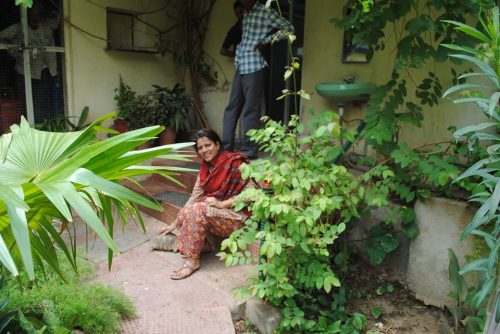
“Our outlook has always been to push the population towards the cities. It’s high time we consider reverse migration,” she says.
Living in a mud house, earning only enough to make a living and fighting against drought for almost four to five years since she started farming, Saraswati leads a content life where she is happy to convert at least a few farmers towards natural farming.
“We are running out of resources, running out of time but we are working in the opposite direction. I have seen 4-5 years of drought. My borewell is almost dry now. But my soil is still moist and the mango trees can sustain with little water. The neighbouring farmers have started asking me the secret. I am happy that though I have not done anything great so far, there are few young farmers who look at me and feel that ‘if she can do it, even we can,’” says Saraswati.
Not only is she setting an example, but also helping the villagers in every aspect possible.
In January 2015, Saraswati started Chenetha Chaitanya Vedika, (roughly translated from Telugu as “platform for revitalising of handloom) with the funding from few of her friends,to give a direct marketing platform to weavers, many of whom were pushed to commit suicide after losing jobs to industrialization.
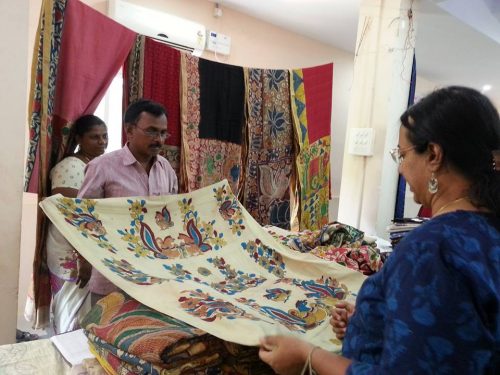
Initially only four to five weavers showed up and could not make much profit from the exhibitions.However, once word spread, weavers from all over Andhra Pradesh joined the movement and the platform has become much like a haat.
The idea behind this system also lies in our age-old haat system where the local farmers and artisans would directly sell their products and have a sustainable living system of their own.
You may also like – Karnataka’s Unlikely Hero, the Humble Millet, Is Helping Farmers Fight Drought & Citizens Get Healthy
“I believe that the way forward lies in sustaining livelihoods rather than the “creation” of jobs, which normally comes by destroying existing livelihoods. Handloom is the second-largest employment provider after agriculture and small trade and it’s time we save it,” she says.
Saraswati continues to make documentaries highlighting these issues. Her last documentary, in 2015, focused on millet-based agriculture. While she continues to do natural farming, she also wishes to continue making films that make us realize that we need to stop hurting the environment in the name of development.
“We are running out of time. We are running out of resources….I think it’s time we come back and start working in the opposite direction by remembering the mantra given by Gandhiji about rural based localized economy,” she concludes.
If you wish to be a part of Saraswati’s movement, you can visit her page Living with Less – Simple Life Movement.
You can also mail her at [email protected] to be a part of her upcoming film on the issue of handloom crisis in India.
Like this story? Or have something to share? Write to us: [email protected], or connect with us on Facebook and Twitter.
NEW: Click here to get positive news on WhatsApp!
This story made me
- 97
- 121
- 89
- 167
Tell Us More
We bring stories straight from the heart of India, to inspire millions and create a wave of impact. Our positive movement is growing bigger everyday, and we would love for you to join it.
Please contribute whatever you can, every little penny helps our team in bringing you more stories that support dreams and spread hope.



















